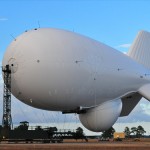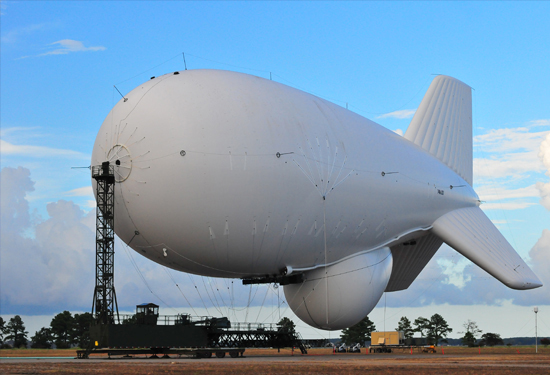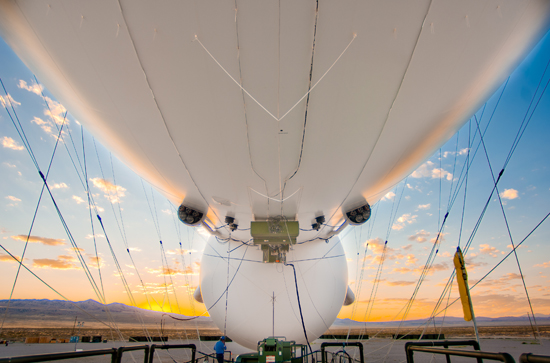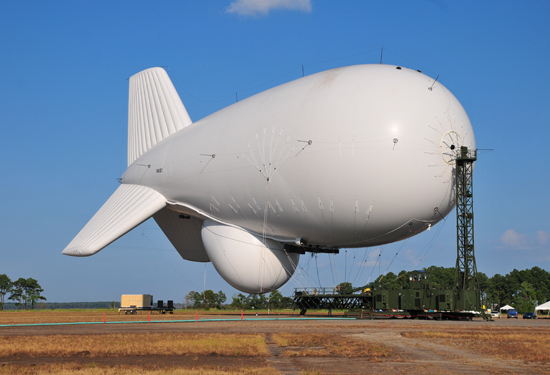By Jim Wolf
WASHINGTON (Reuters) – A pair of big, blimp-like craft, moored to the ground and flying as high as 10,000 feet, are to be added to a high-tech shield designed to protect the Washington D.C. area from air attack, at least for a while.
The bulbous, helium-filled “aerostats” – each more than three quarters the length of a football field at 243 feet – are to be stitched into existing defenses as part of an exercise of new technology ordered by the Defense Department.
The coming addition to the umbrella over Washington is known as Joint Land Attack Cruise Missile Defense Elevated Netted Sensor System, or JLENS. Raytheon Co is the prime contractor.
Raytheon’s JLENS aerostat flies over Elizabeth City NC first official flight Aug 25 2009
Photo: Raytheon“We’re trying to determine how the surveillance radar information from the JLENS platforms can be integrated with existing systems in the National Capital Region,” said Michael Kucharek, a spokesman for the North American Aerospace Defense Command.
NORAD, a binational command, is responsible for defending air space over the United States and Canada, including the Washington area with its many pieces of important infrastructure.
The most significant air attack in the area took place on September 11, 2001, when Al Qaeda militants hijacked American Airlines Flight 77, a Boeing 757, and crashed it into the Pentagon.
To expand the time available to detect and defend against any future attacks from commercial aircraft, major changes were made under Operation Noble Eagle, combat air patrols begun after the September 11 attacks.
Airspace restrictions were extended. U.S. Army Sentinel radars for low-altitude radar coverage and short-range Stinger/Avenger missile batteries were deployed.
Washington is currently guarded by an air-defense system that includes Federal Aviation Administration radars and Department of Homeland Security helicopters and fixed-wing aircraft on alert at Reagan National Airport to intercept slow, low-flying aircraft.
EXPECTED BY END OF SEPTEMBER
The JLENS craft are expected to arrive in the capital area by September 30, according to Kucharek, who is also a spokesman for the U.S. Northern Command, which coordinates the Pentagon’s homeland defense role.
A “capabilities demonstration,” as the test is called, is expected to last as long as three years. Its location is being withheld, pending notification of lawmakers and others.
JLENS craft work in a roughly $450 million pair, known as an orbit, each tethered to mobile moorings. One of the aerostats carries a powerful long-range surveillance radar with a 360-degree look-around capability that can reach out to 340 miles. The other carries a radar used for targeting.
Operating as high as 10,000 feet for up to 30 days at a time, JLENS is meant to give the military more time to detect and react to threats, including cruise missiles and manned and unmanned aircraft, compared with ground-based radar.
The system is also designed to defend against tactical ballistic missiles, large caliber rockets and moving vehicles that could be used for attacks, including boats, cars and trucks.
A success in the U.S. capital area could give a boost to the JLENS program, which has been scaled back sharply along with the Pentagon’s other 15 or so lighter-than-air vehicle efforts.
Blimp-like craft offer several advantages compared with fixed-wing aircraft, including lower cost, larger payload capacity and extended time aloft. However, their funding is to fall sharply as Pentagon spending shrinks to help pare trillion-dollar-a-year U.S. deficits.
Peter Huessy, a consultant on nuclear deterrence and missile defense, said the system would compliment current U.S. missile-defense capabilities.
Source: Reuters.com





